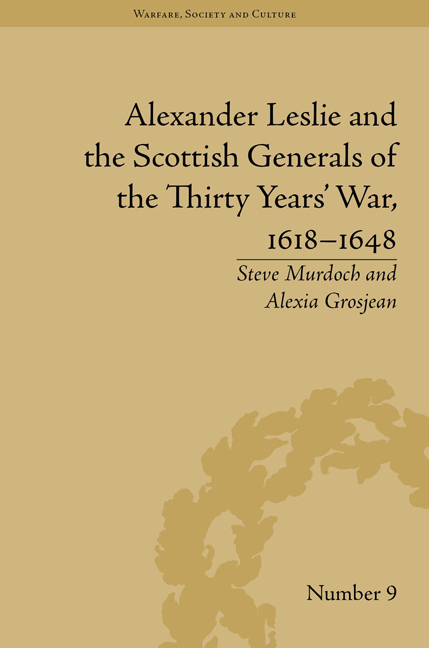Book contents
- Frontmatter
- CONTENTS
- Dedication
- Acknowledgements
- Abbreviations
- Stylistic Conventions
- Introduction
- 1 Scotland's Indigenous Military Cultures
- 2 The Scottish Military Diaspora
- 3 The Thirty Years' War Campaigns: Stralsund to Prague, 1628–35
- 4 Alexander Leslie and the Army of the Weser, 1635–9
- 5 The Home Front: Leslie, Ruthven and the Bishops' Wars, 1638–41
- 6 The Scottish ‘Veteran Generals’ in England, 1642–7
- 7 Going Full Circle: The New Scottish Command in Europe, 1639–48
- Conclusion
- Appendix
- Notes
- Works Cited
- Index
Stylistic Conventions
- Frontmatter
- CONTENTS
- Dedication
- Acknowledgements
- Abbreviations
- Stylistic Conventions
- Introduction
- 1 Scotland's Indigenous Military Cultures
- 2 The Scottish Military Diaspora
- 3 The Thirty Years' War Campaigns: Stralsund to Prague, 1628–35
- 4 Alexander Leslie and the Army of the Weser, 1635–9
- 5 The Home Front: Leslie, Ruthven and the Bishops' Wars, 1638–41
- 6 The Scottish ‘Veteran Generals’ in England, 1642–7
- 7 Going Full Circle: The New Scottish Command in Europe, 1639–48
- Conclusion
- Appendix
- Notes
- Works Cited
- Index
Summary
In writing this book we have encountered numerous language variants for place and personal names. We have tried to keep these to the most appropriate language version, with alternatives given where these vary dramatically from the version given in the original source. In terms of Scottish surnames, we have standardized names to single versions to avoid confusion, especially where numerous alternatives exist, such as Colonel Patrick More, who is variously also recorded as Mòr, Moor, Muir or Mohr. Variant forms of Scottish first names, for example Hans, Johan and John, have also been standardized. More complicated, perhaps, is the rendering of the names of the many ethnic Scots in the book as these are often recorded completely differently among various communities. For example, the Finnish-born Major General Arvid Forbes was called by his fellow Scots ‘Alexander Finnese Forbes’; Major General Jacob Duwall went by the name James Macdougall in Scottish company; while Colonel Johan Skytte naturalized as a Scot under the name Sir John Skite. Where such alternatives are present, we have indicated them in the text.
Throughout this book a variety of monetary denominations have been used. The two most common are pounds and riksdaler. After 1603 the value of the Scottish and English currencies were fixed so that twelve Scots pounds equalled one English one. Where it is known, we have identified which currency is meant.
- Type
- Chapter
- Information
- Publisher: Pickering & ChattoFirst published in: 2014



